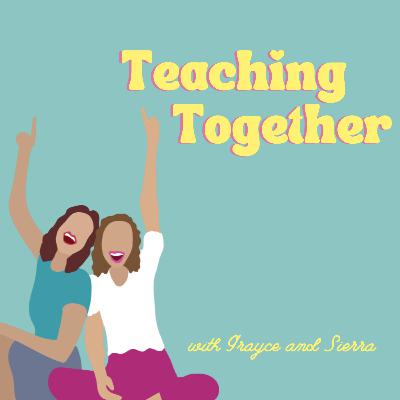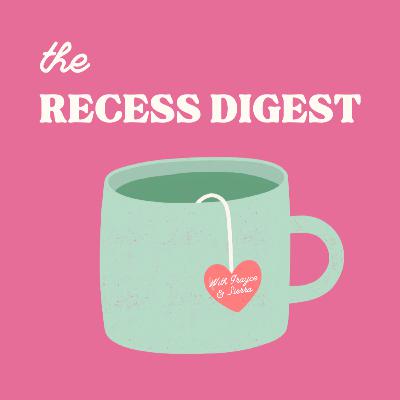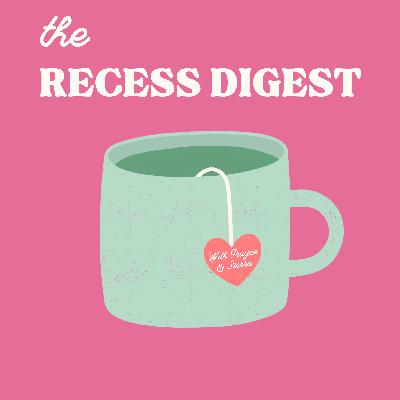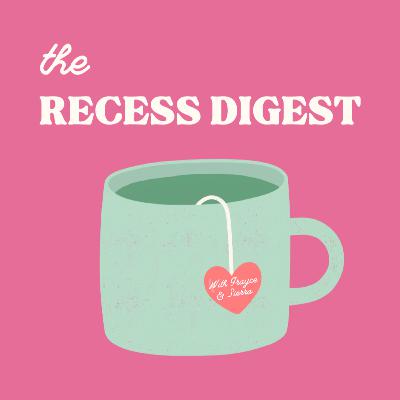Discover Teaching Together
Teaching Together

37 Episodes
Reverse
Welcome to another episode from the learning lounge! Today's special guest Matt Pitman, author of The Connection Curriculum, joins in for a powerful conversation unpacking some of the big, confronting questions for educators everywhere. We think about who our school system is serving, what does it mean to truly connect with students and help them find meaning in their learning. We also explore how school refusal and teacher burnout reflect deeper systemic issues, and why shifting our focus toward authentic connection could be a key part of the solution.Helpful Links 💡📘 The Connection Curriculum – Buy the book📲 Follow Matt Pitman on Instagram – @mattlukepitmanRecording this at PD? Here are the relevant APSTs: Focus Area 1.1 – Physical, social and intellectual development and characteristics of studentsFocus Area 4.1 – Support student participationFocus Area 7.4 – Engage with professional teaching networks and broader communities
Today we’re getting honest about the emotional and professional expectations we had walking into the classroom and how reality has reshaped those over time.We open up about the emotional energy that teaching demands from us, some of the realities of which neither of us quite expected. We also challenge some of the professional expectations that we once thought were non-negotiables — think Pinterest-worthy displays, colour-coded planners, and perfectly ‘evidence-based’ practice. Spoiler: we’ve learned that sometimes, doing the bare minimum is actually doing your job well. Helpful links 💡If you need a pick me up - Bluey Cake FailRecording this as PD? Here are the relevant APSTs:Focus Area 7.4 - Engage with professional teaching networks and broader communities
In today's Recess Digest episode we continue exploring some more of the "Habits of Mind" that relate to creative thinking. We discuss some of the challenges that appear when students believe that they aren't creative, and share some ideas and strategies to help give your students procedures for developing creative thinking processes. Helpful Links 💡Habits of Mind InstituteProject Zero - Thinking Routines ToolboxOur Habit of Mind StampIf you enjoyed this episode, make sure to follow, rate and share it with your fellow educators!
With NAPLAN testing in full swing, we’re diving into the real purpose of formative and summative assessment—how they work together, shape student learning and our own practice.Of course, we can’t have this conversation without stepping onto our soapbox about standardised testing. Are we assessing what truly matters, or just what’s easiest to measure? And what does that mean for the way we teach?Join us today for a challenging conversation that might just give you some food for thought as we consider the impact of standardised testing and the push for measurable performance outcomes on almost everything else we do as teachers. Helpful Links 💡Schiro's Curriculum Ideologies Classroom Assessment and Pedagogy - Black and WilliamRecording this as PD? Here are the relevant APSTs:Focus Area 5.1 – Assess student learning
How do we make sure that our fast finishers aren't just doing 'busy work?' In this episode, we explore the research on extending and challenging students in the classroom, drawing on insights from the latest AERO practice guide. We’ll break down what meaningful challenge looks like in the classroom and share some practical techniques and strategies that you can draw on to effectively extend and challenge all learners, not just your 'fast finishers.'Helpful Links 💡AERO Practice Guide – Extend and ChallengeRecording this as PD? Here are the relevant APSTs:Focus Area 1.5 – Differentiate teaching to meet the specific needs of students Focus Area 3.1 – Establish challenging learning goalsFocus Area 4.1 – Support student participation
Mistakes happen, but do your learners see mistakes as roadblocks or learning opportunities? As we head into a new school year and work towards building safe and positive classroom environments, we have a chat about the research on error climate in the classroom and explore how students’ perception of mistakes shape their motivation, confidence, and willingness to take risks.We’ll share some practical strategies to help students build their tolerance for errors and consider how our own reactions and responses shape the error climate in our classrooms—often more than we realise!Helpful Links 💡British Journal of Educational Psychology - Error ClimateEdutopia: Growing Students' Mistake ToleranceAPA: The Interplay Between Mistakes and LearningRecording this as PD? Here are the relevant APSTs:Focus Area 3.3 – Use teaching strategies Focus Area 4.1 – Support student participationFocus Area 6.2 – Engage in professional learning and improve practice.
In this special episode, we chat with one of our friends, Hannah, about the ups and downs of her first few years as a teacher. Together, we reflect on first-year challenges, favourite teaching moments and the lessons that come with more time and experience in the classroom. Hannah shares her journey to obtaining approval to teach in the NSW Department and the importance of working together with your colleagues...especially when you decide that putting on a school musical in your first year of teaching would be fun! Whether you are heading towards your first year of teaching or just reflecting on your growth, this episode reminds us that there is indeed light at the end of the tunnel!Helpful Links 💡NSW Department of Education: Approval to Teach
In today's Recess Digest, we're unpacking two more Habits of Mind - Applying Past Knowledge and Taking Responsible Risks. We chat a little bit about what these habits mean and share some ideas and language you can use in your classroom to start building these habits in your own learners! Helpful Links 💡Teaching Together Habits of Mind Stamp!The Habits of Mind InstituteProject Zero - Thinking Routines
Parent–teacher interviews: love them or dread them, they’re one of the most nerve-wracking parts of the school year. In this episode, we get honest about how we typically prepare, and share some strategies for both primary and high school settings, including how to navigate the tricky conversations that inevitably come up from time to time.You’ll also hear some practical wisdom from one of our favourite books for new graduate teachers, Bianca Hewes’ On Teaching — including her must-have interview survival tips — and we’ll share our own hacks for keeping calm, confident, and compassionate during long nights of back-to-back meetings.Whether you’re a beginning teacher heading into your first round of interviews, or if you just want to feel a little less panicked and a little more prepared, this episode has something for you!Recording this as PD? Here are the relevant APSTs: Focus Area 3.7 - Engage parents/carers in the educative processFocus Area 7.3 - Engage with the parents/carersFocus Area 7.4 - Engage with professional teaching networks and broader communitiesHelpful Links 💡On Teaching by Bianca Hewes (Five Senses Education)Cool.org – Connecting with Parents: Sustainable Connection for Stronger Family–School Partnerships
Welcome to Term 3! Whether you are a few weeks in or just getting started, the end-of-winter burnout is probably creeping in, if it hasn't already crash-landed in front of you.In this episode, we talk honestly about the emotional rollercoaster of teaching across the term and pull apart some recent research about teacher wellbeing, including some surprising stats on how our energy and motivation shift week by week as the term goes on.We also share some practical strategies and mindset shifts that have helped us to reset and win the arm wrestle against fatigue and burn out as the term goes on. If you’re feeling flat, fatigued, or like you're just going through the motions — this episode is your mid-year circuit breaker! 💡 Helpful Links: Be You Educator Wellbeing Toolkit Be You Wellbeing Tools for Teachers Be You Professional Learning for Educators Black Dog Institute – Teacher Wellbeing ReportUNSW: Boosting Wellbeing at the Start of Term📝 Recording this as PD? Here are the relevant APSTs:• 6.2: Engage in professional learning and improve practice• 7.3: Engage with colleagues and improve practice• 7.4: Engage with professional teaching networks and broader communities• 4.4: Maintain student safety and wellbeing
In this episode, we’re talking all things Proficient Teacher Accreditation. Whether you’re at the beginning of your accreditation journey or mentoring someone through it, this episode has got something for you. Sierra shares a few of her top tips to keep the stress levels low (did someone say proficiency party??) and Grayce shares how she has found the process to be so far. We unpack the steps involved in NSW with plenty of practical tips, break down how to annotate your evidence, and touch on how the process compares in other Australian states, (spoiler alert, it's not too different).You’ve got this — and we’re here to cheer you on! Want our free Evidence Planning Matrix?Send us a DM with the word “Proficient” over on Instagram @teachingtogetherthepodcast and we’ll send it your way!Other Helpful links 💡Apply for Proficient Teacher (NESA)Evidence Guide PDF (NESA)AITSL Standards – Proficient Compare the process in other states:VIC (VIT)QLD (QCT)SAWANTACTTAS Recording this as PD? Here are the relevant APSTs:Focus Area 6.1: Identify and plan professional learning needsFocus Area 6.2: Engage in professional learning and improve practiceFocus Area 7.2: Comply with legislative, administrative and organisational requirementsFocus Area 7.4: Engage with professional teaching networks and broader communities
We are back for Term 2 and are super keen to bring you this conversation with Tom Mahoney, a passionate educator and PhD candidate at Deakin University. Tom's work involves exploring the impact of educational ideologies on education and educators, and seeks to look for ways to help teachers critically reflect on the ins and outs of their practice. We hope you find this discussion really helpful, maybe even challenging, as we consider the 'why' behind what we do. Helpful Links 💡Check out Tom's Blog HereRecording this as PD? Here are the relevant APSTs:Focus Area 6.2 - Engage in professional learning and improve practiceFocus Area 6.3 - Engage with colleagues and improve practice
We know how important it is to equip students with strong writing skills, but how do we ensure writing is truly integrated across all subjects—not just in English? In this episode, Christine Teahan, the Co-Director of Academics at The Writing Revolution, joins in for a discussion on why writing instruction matters at every level of education. Christine shares valuable insights on how teachers can embed explicit writing instruction into all subject areas, helping students become stronger thinkers, communicators, and learners. Regardless of your context, this is such a helpful and valuable conversation!Recording this as PD? Here are the relevant APSTsFocus Area 2.1 - Content and teaching strategies of the teaching areaFocus Area 2.5 - Literacy and Numeracy StrategiesHelpful Links 💡The Writing Revolution
BONUS EPISODE ALERT! 🚨Hey Teachers! We hope you have been loving your school holidays and enjoying a well-deserved rest. As the start of Term One approaches, we wanted to bring you some bonus content to help with your planning and to give you a little bit of inspiration as you prepare for this school year. We are joined today by Andrea Hillbrick, an educational consultant who draws on her vast knowledge and experience as a teacher to share with us 10 strategies we should 'pack' into our teacher bags for 2025. We both came away from this chat feeling so excited and inspired for this year, and we hope it does the same for you!!Recording this as PD? Here are the relevant APSTsFocus Area 2.1 - Content and teaching strategies of the teaching areaFocus Area 2.5 - Literacy and numeracy strategiesFocus Area 3.3 - Use teaching strategiesFocus Area 3.4 - Select and use resourcesHelpful Links 💡Andrea's Website (full of helpful resources and info!)10 Teaching Ideas from AndreaAndrea's Instagram
As the year comes to a close, join us as we craft some adorable clay fridge magnets for Grayce's kindy students and and spend some time reflecting on her first year as a teacher.We also dive into the festive season with a lighthearted discussion about Christmas gifts—teacher presents, thoughtful gestures for colleagues, and ideas for managing the gift budget. It's a little different to our usual format, but it’s the perfect way to wrap up and celebrate the year that was.Whether you're wrapping gifts, finishing reports, or just looking for some cheerful company, press play and let’s wrap up 2024 together!
Today's second Recess Digest episode continues exploring some more of the "Habits of Mind" - Metacognition, Flexible Thinking and Questioning. We feel that these dispositions are all really closely related and that fostering them in your classrooms doesn't happen without intentional planning and purpose. Listen in for some ideas and strategies to develop routines and habits in your classroom that build these essential habits for our learners.Helpful Links 💡Habits of Mind InstituteProject Zero - Thinking Routines ToolboxIf you enjoyed this episode, make sure to follow, rate and share it with your fellow educators!
In today's (slightly longer than usual) episode, we’re breaking down key strategies from the 'Great Teaching Toolkit' to help you promote deeper learning and critical thinking in your classroom. We guide you through six core elements—Structuring, Explaining, Questioning, Interacting, Embedding, and Activating—giving you practical tips and examples that you can start using right away.You’ll learn how to simplify complex ideas without overwhelming your students, ask the right questions to encourage critical thinking, and help your students become more independent learners. Whether you’re an experienced educator or just starting out, this episode offers actionable insights to help you foster more meaningful learning experiences in your classroom.TL;DR Overview of the Great Teaching Toolkit’s four dimensions Six elements to deepen student thinking How to structure lessons to engage and challenge students Managing cognitive load while simplifying explanations Asking better questions and using feedback to drive deeper thinking Encouraging students to take ownership of their learningHelpful Links 💡 Great Teaching Toolkit Evidence ReviewProject Zero Thinking Routines ToolboxUnderstanding How We Learn - BookRecording this as PD? Here are the relevant APSTs: Focus Area 1.2 - Understand how students learn Focus Area 3.3 - Use teaching strategies Focus Area 4.1 - Support student participation Focus Area 5.1 - Assess student learning If you enjoyed this episode, don’t forget to follow, rate, and share it with your colleagues! Stay tuned for more strategies to support your students' learning.
In today's episode, we’re here to help you feel more confident and prepared for your teaching placements. From packing your teacher-bag to managing lesson timing and taking care of your voice, we’ll share practical tips that make a big difference. Whether you are heading out on your first or final placement, this episode episode is packed with essentials to guide you through.Helpful Links 💡Voice Care for TeachersProtecting Your Teacher VoiceBe sure to send this to someone you know who might be preparing for their placement. Remember to follow, rate, and leave a review!
Imagine this. You have spent all weekend writing detailed feedback comments all over your students' assessment tasks, only to have them look at their score and throw the rest of the paper away. Sound painful? Join us today as we explore the powerful impact feedback can have in your classroom and how you can make feedback more effective for you and your students without adding to your workload. This episode is full of practical strategies for engaging your students in the feedback process because feedback should be more effort for them than it is for you!Helpful Links 💡NSW Education: Feedback Practices and StrategiesAITSL Spotlight: FeedbackRecording this as PD? Here are the relevant APSTs:Focus Area 5.2 - Provide feedback to students on their learning.
Welcome to the very first of our Recess Digest episodes, where we aim to bring you quick ideas and helpful insights in the time it would take for you to eat your recess! Today we dive into two "Habits of Mind" that are essential for both students and teachers: persisting and managing impulsivity. These are skills that not only help in academic success but also support emotional intelligence and long-term resilience. We'll share some practical tips and strategies that you can easily implement in your classroom to help your students develop these habits and grow as life-long learners. Helpful Links 💡Habits of Mind InstituteHabits of Mind Explanations for Teachers If you enjoyed this episode, make sure to follow, rate, and share it with your fellow educators! Stay tuned for more "Recess Digest" episodes to come.








